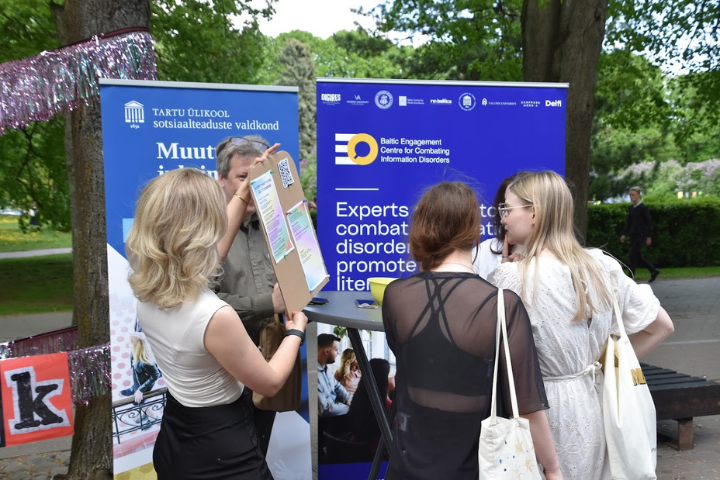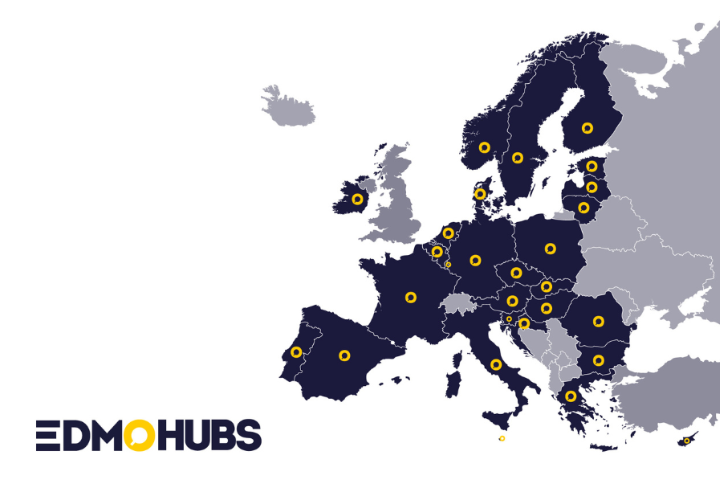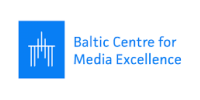
About Us
We bring together experts in fact-checking, media literacy, media practice, and academic research. Our key activities include performing regular fact-checks within private and public media outlets in Baltics (lead partner: AS Ekspress Meedia (Delfi EST)), carrying out studies on the perception of disinformation amongst different media audiences and analyze disinformation trend (lead partner: University of Tartu) and executing media literacy campaigns to increase information resilience and improve media / digital literacy among different age groups (lead partner: Baltic Centre for Media Excellence).

BECID
-
- 20+ new partners in the Baltics, Europe and Estonia
- 800+ fact-checks
- 100+ podcast episodes
- 20+ overviews of false narratives and disinfo trends
- 6 studies, the latest being “The Regulation of Fact-checking and Disinformation in the Baltic States”
- 10 000+ individuals trained in media literacy (the highest number within the EDMO hubs)
- 300+ media literacy training sessions for all citizens
- 50+ media literacy training sessions for teachers
- 30+ media literacy training sessions for seniors
- 50+ news media appearances
-
- Biggest pan-Baltic cooperation on combating disinformation to date: as of August 2024, there are 69 people collaborating in BECID
- Establishing contact with social media platforms thanks to being part of the EDMO network
- Pan-European collaborations, i.e. during the EU Parliament elections via joint the Task Force, Rapid Alert System and joint campaign on social media
- Continuous exposure and analysis of regionally relevant false narratives
- Archive of disinfo in the region for future fact-checkers, journalists, researchers and analysts
- BECID supports the sustainability and continuity of fact-checking as an economically unviable yet essential public service
-
- Quick access to an international network of researchers, where Baltic researchers can access preliminary findings from other research groups
- Obligation to directly share findings of the research with the target group, i.e. sharing findings on the best practices and tools for fact-checking directly with our regional fact-checkers and organizing trainings with teachers to introduce the materials produced
- Empowering early career researchers via inclusion into research working groups and task forces of EDMO, i.e. joining
- We organized regular workshops to teach digital skills to seniors throughout 2023 in collaboration with high school student trainers
- Tested out early childhood MIL interventions with kids aged 6–8 by designing offline interventions about online threats
Partners
-

University of Tartu, Institute of Social Studies (Estonia)
UTARTU is the national university of the Republic of Estonia, according to the University of Tartu Act and is a research organization according to its statute. UTARTU is Estonia’s leading centre of research and training and belongs to the top 1.2% of the world’s best universities, according to the QS World University Rankings and the Times Higher Education (THE) World University Rankings. UTARTU accounts for more than a half of all the doctoral degrees conferred, research publications, and national R&D financing in Estonia. UTARTU has extensive academic contacts and collaborative research projects with universities worldwide. According to information on the ISI Web of Science, UTARTU belongs to the top 1% of the world’s most-cited universities and research institutions. The work within BECID will be carried out by the Institute of Social Studies (ISS), which is an esteemed centre of competence in communication and information sciences, social work and policy. QS University Rankings by Subject has placed our media and communication research among the world’s best fields 150-200 for six consecutive years by now, which is a unique result for the whole of Estonia. ISS has a long record of international research projects, multilingual work outcomes and transnational consortia.
Representatives: Maia Klaassen, Inger Klesment, Regina Lapp, Andra Siibak, Marju Himma-Kadakas, Ragne Kõuts-Klemm, Signe Ivask, Kristjan Kikerpill, Sten Torpan, Maria Murumaa-Mengel, Annaliisa Post, Gretel Juhansoo.
-

Tallinn University (Estonia)
TLU is one of the three largest Estonian universities, and is an integrated research and development, creative, educational and cultural institution as per Tallinn University Act.16 By focusing resources and activities, TLU develops the following interdisciplinary research-based focus fields: educational innovation, digital and media culture, cultural competencies, healthy and sustainable lifestyle, and society and culture. The work within BECID will be carried out by the Baltic Film, Media and Arts School, which serves as a competence centre for communication and audio-visual knowledge and expertise.
Representatives: Andres Kõnno, Andres Jõesaar, Barbi Pilvre, Katrin Saks, Katrin Sigijane, Külli-Riin Tigasson.
-

Vytautas Magnus University (Lithuania)
Vytautas Magnus University (VMU) is a comprehensive university located in Kaunas, Lithuania. It was established in 1922 and closed in 1950, before being re-established in 1989. VMU has a reputation for being open to different forms of cooperation, both nationally and internationally, in order to expand its knowledge and respond to current issues in the political, economic, and socio-cultural environment. Recently, VMU has been actively involved in the process of merging higher education institutions in Lithuania, resulting in the formation of VMU as the second largest comprehensive university in the country. The Department of Public Communications at the Faculty of Political Science and Diplomacy is responsible for the implementation of the BECID project. The department is known for its advanced journalism and media/communications education and research, and has expertise in media systemic transformations, journalism and media cultures, technological modernizations, journalistic professionalism, media policy and governance, and media and information literacy. In 2018, the department was awarded the title of the UNESCO Chair on Media and Information Literacy for Inclusive Knowledge Societies.
Representatives: Auksė Balčytienė, Kristina Juraitė, Rimgailė Kasparaitė, Kristina Berksun, Patricija Lenčiauskienė
-

Vidzeme University of Applied Sciences (Latvia)
ViA is a public university that is internationally recognized for its strong focus on fundamental and applied research and international cooperation. In 2020, 45% of its budget came from various grants and research funding, and it employed 45 full-time equivalent staff. The university’s mission is to promote the sustainable development of a knowledge-based society on a regional, national, and international level, and to provide high-level professionals to both the private and public sectors. In addition, ViA conducts research to address societal challenges. The university is a member of the European University Alliance, and is currently working on the “Engaged and Entrepreneurial European University as Driver for European Smart and Sustainable Regions” project. The Institute of Social, Economic and Humanities Research, which is involved in this project, was established in 2013 with the goal of conducting open and creative scientific research, making the results public, and promoting their application in the development of smart communities on various levels. ViA has extensive experience in areas such as strategic communication, disinformation, media and information literacy, civic participation, institutional, political and societal trust, and science literacy.
Representatives: Katrīne Kūkoja, Agnese Davidsone, Jānis Buholcs, Solvita Denisa Liepniece, Linda Veliverronena, Iveta Auniņa. NODIBINAJUMS BALTIJAS PETNIECISKAS ZURNALISTIKAS CENTRS (Re:Baltica; Latvia)
-

Re:Baltica
Re:Baltica is a non-profit organization that produces investigative journalism and fact-checking in the Baltic region, with a focus on disinformation. Since 2012, they have focused on analyzing disinformation originating in Russia and on tracking trends, sources, and super-spreaders in the lead up to elections. In 2019, they established a fact-checking unit called “Re:Check,” which publishes regular fact-checks in Latvian and Russian and is IFCN certified. In 2020, Re:Check partnered with Facebook as a third-party fact-checker to combat disinformation related to the COVID-19 pandemic. Re:Baltica raises funds through donations, grants, and its own economic activity, which includes providing fact-checking services to Facebook and teaching, lecturing, and research for documentary production. Their annual budget is around 300,000 euros, and their work is available for free republishing and is accessible without a paywall in Latvian, Russian, and English.
Representatives: Sanita Jemberga, Evita Purina.
-

Baltic Centre for Media Excellence (BCME) (Latvia)
BCME is a non-profit NGO based in the Baltic region, consisting of 13 founding members including public broadcasters, media associations, and universities. It is governed by a Board of seven members elected by the founding members, and managed by an Executive Director chosen by the Board. BCME receives funding from various governments and international organizations, including NATO, the British Council, and UNESCO. The organization’s focus includes media development and media literacy, with a strong emphasis on combating disinformation and promoting critical thinking skills. BCME’s media literacy efforts are tailored to different segments of the media audience, including those particularly vulnerable to propaganda and disinformation. The organization has a network of trainers, researchers, experts, and media representatives across the Baltic region and beyond.
Representatives: Gunta Sloga, Dalia Bankauskaite, Solvita Denisa-Liepniece.
-

Delfi Uzdaroji Akcine Bendrove (DELFI UAB; Lithuania)
DELFI UAB runs an online news outlet, is an official media partner of Facebook’s third-party fact checking program and its fact-checking project The Lie Detector (Melo detektorius in Lithuanian) is IFCN certified. Melo detektorius publishes fact checks assessing the validity of various claims and popular myths. In 2021 alone, fact checkers published over 500 articles in Lithuanian and Russian that debunk outrageous claims circulating online. Another project, Debunk (Demaskuok in Lithuanian) was officially founded in 2018 after it secured funding from Google DNI Fund and Delfi Lithuania. Debunk relies on an AI-based disinformation detection tool that was developed in DELFI UAB and is able to detect emerging disinformation campaigns 2 minutes from their publication. The project has a separate articles’ section under the same name where journalists debunk pre-orchestrated, mostly Kremlin-related disinformation campaigns.
Representatives: Ieva Ivanauskaitė, Aistė Meidutė.
-

Akciju Sabiedriba Delfi (AS Delfi, Latvia)
AS Delfi is a national media organization – the leading news portal in Latvia. Monthly readership is 833 thousand according to January 2022 figures from a media audience survey by the research company Gemius. For many years now, AS Delfi has been the online media source with the largest audience in Latvia, as well as the leading media source on social media. AS Delfi is a three-time winner of the Most Influential Media Source on Social Media award (in 2015, 2016 and 2017), and two-time winner of the favourite media brand in Latvia (2020 and 2021). AS Delfi’s Facebook page has the highest number of followers for a Latvian-language media source: 160,891. AS Delfi employs 81 editors and journalists who create written, video and audio content in Latvian and Russian on both political and lifestyle topics. The subscription-based AS Delfi Plus, offering analysis and extended content, was founded in 2019, and as of January 2022 it has 12,100 active subscribers, which is the leading number of digital subscriptions in Latvia, and proves the status of trustful media brand. AS Delfi is a member of the Latvian Media Ethics Council. Several AS Delfi journalists are members of the Latvian Association of Journalists. Since 2020 AS Delfi has established the special category “Atmaskots” (Debunked) for publishing the fact-checking materials and other content that fights disinformation.In late 2021 AS Delfi became IFCN certified fact-checkers.
Representatives: Filips Lastovskis.
-

AS EKSPRESS MEEDIA (Estonia)
Eesti Päevalehe Faktikontroll (EPF) is a fact-checking unit based in Estonia and accredited by the International Fact-Checking Network (IFCN). EPF focuses on investigative journalism and fact-checking, including issues related to disinformation and propaganda. The team consists of five people, with one person solely dedicated to fact-checking, two people working on both investigations and disinformation topics, and two people focused on investigations. EPF also collaborates with the Estonian Debating Society (EDS), with volunteers from EDS regularly publishing fact-checks according to an internally agreed and publicly available method. EPF publishes an average of 5-10 fact checks per month, which are always made available to the public without a paywall. In order to maintain editorial independence, EPF is open to funding its activities through grants and agreements with third parties. As of now, EPF has received funding from the IPI Newsspectrum grant for a pilot project of Russian language fact-checking and is a copartner of Facebook’s third-party fact-checking program.
Representatives: Holger Roonemaa, Erik Moora, Mari-Liis Somelar, Marta Vunš.
-

Sia Vidzemes Televizija (Latvia)
Ltd “VIDZEMES TELEVĪZIJA” (TV channel ReTV) is one of the five channels that are available for free in terrestrial broadcasting in Latvia. ReTV combines content of 12 regional TV broadcasts into a single channel with at least 5-7hours of original content per day. ReTV has the largest correspondent network in the region and a strong News Department. On linear TV, we reach an average audience of 600 000 a month. Through our web portal and social media, we reach an audience we don’t reach on linear TV (ReTV Facebook has 40 000 followers, YouTube – 15 800 followers).
Representatives: Elina Leimane, Inga Gorbunova.